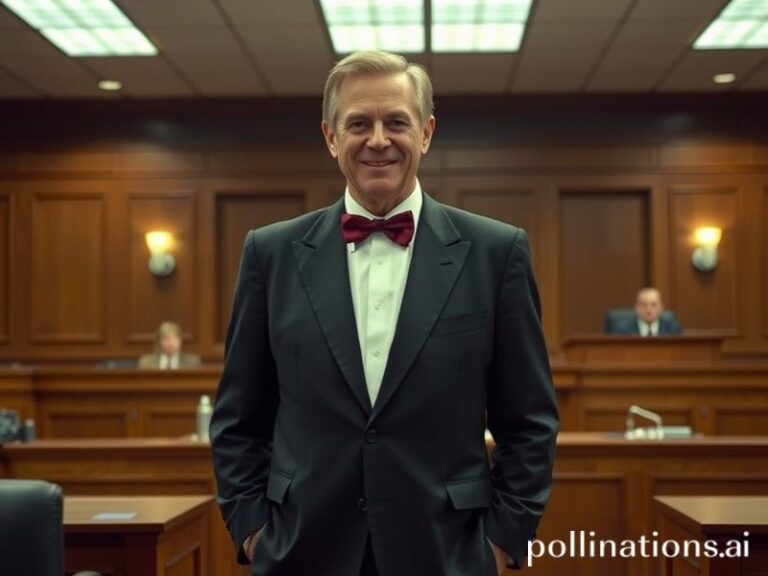License to Thrill: How James Bond Became the World’s Last Functioning Export
The Spy Who Never Retired: How James Bond Became the Last Remaining Global Soft-Power Superpower
By Our Man in Geneva with the Hangover
When the credits rolled on *No Time to Die* in 2021, MI6’s most flamboyant employee technically ceased to exist in the continuity—blown to a respectful, socially-distanced mist somewhere off the coast of Okinawa. Yet Bond refuses to die in the collective imagination of a planet that can’t even keep its own climate under 1.5 °C. Instead, 007 has quietly metastasized into the final piece of functioning British export machinery, a tuxedoed Brexit dividend still clearing customs everywhere from Lagos cineplexes to the Shanghai IMAX, where audiences line up to watch the Empire’s greatest civil servant seduce foreign nationals and wreck their infrastructure.
The numbers are almost indecent. The franchise has grossed over $7 billion—roughly the combined GDP of Fiji and the Solomon Islands, give or take a coconut—and that’s before counting the Aston Martin-branded keychains now clogging landfills on six continents. While the actual United Kingdom negotiates trade deals with the enthusiasm of a man trying to sell warm beer on a hot beach, Bond glides across borders with no visa, no quarantine, and zero regard for local aviation law. If soft power were measured in decibels, the Bond theme would be illegal in the EU.
Of course, the world has changed around him. In the 1960s, Bond saved us from SPECTRE, a criminal organization that now looks adorably analog compared to today’s multinational tax-avoidance schemes. In 2024, Blofeld would simply register Spectre Holdings in Delaware, buy a Caribbean passport, and spend the afternoon kite-surfing with the Cayman Islands premier. Meanwhile, the new geopolitical villains—algorithmic traders, energy oligarchs, whoever is running TikTok’s For You page—don’t bother with volcano lairs when they can crash entire currencies from a WeWork in Lisbon.
Still, Bond persists, a walking anachronism clutching a Walther PPK in one hand and a shaken martini in the other, while the rest of us fumble with two-factor authentication. His continued relevance is less about espionage than about nostalgia for a time when threats were containable, women had suggestive names, and the worst thing MI6 misplaced was a microfilm, not the personal data of 1.2 million civil servants. Each new installment is an international Rorschach test: Americans see a suave special relationship; Russians see a cautionary tale of alcoholism; the French see a Brit who can’t cook but still gets laid.
Casting Daniel Craig was supposed to drag the franchise into the morally ambiguous 21st century, giving us a Bond who bleeds, broods, and once lost a card game to a guy with asthma. Yet even Craig’s final outing ended with the sort of climactic drone strike that, outside the cinema, would trigger a UN special session. Audiences wept, not because Bond died, but because someone in 2023 still believed in a rules-based order where a lone agent could fix things without a Senate subcommittee hearing.
Now Eon Productions faces the delicate task of rebooting 007 for an age of performative allyship, carbon offsets, and mutually assured economic destruction. Rumors swirl of a Bond who recycles his gadgets, respects jurisdictional boundaries, and asks for verbal consent before unzipping the Aston Martin’s gearstick. Early betting markets favor Idris Elba, Dev Patel, or—if Netflix wins the bidding war—an AI-rendered composite of every passport photo ever taken at Heathrow. Whichever visage emerges, the real question is whether Bond can still sell Britishness in a world that has largely outsourced its spying to Silicon Valley and its charm to K-pop.
Probably. Because beneath the tuxedo, Bond is less a character than a coping mechanism: the fantasy that somewhere out there is a man who knows exactly which wire to cut, which drink to order, and which dictator’s mistress to seduce for the greater good. While the rest of us doom-scroll through headlines about melting ice caps and crypto empires, Bond is already skiing away from the avalanche in a perfectly tailored avalanche. He may be fiction, but in a marketplace of collapsing certainties, he remains the most reliable British product since the phrase “Keep Calm and Carry On.”
So here’s to 007: the last licensed-to-kill reminder that once upon a time, problems were solvable in under 150 minutes, villains had the decency to monologue, and the world still believed in a man, a plan, and a perfectly timed explosion. Just don’t check the small print on the collateral damage. Some things are still classified—even from the audience.







